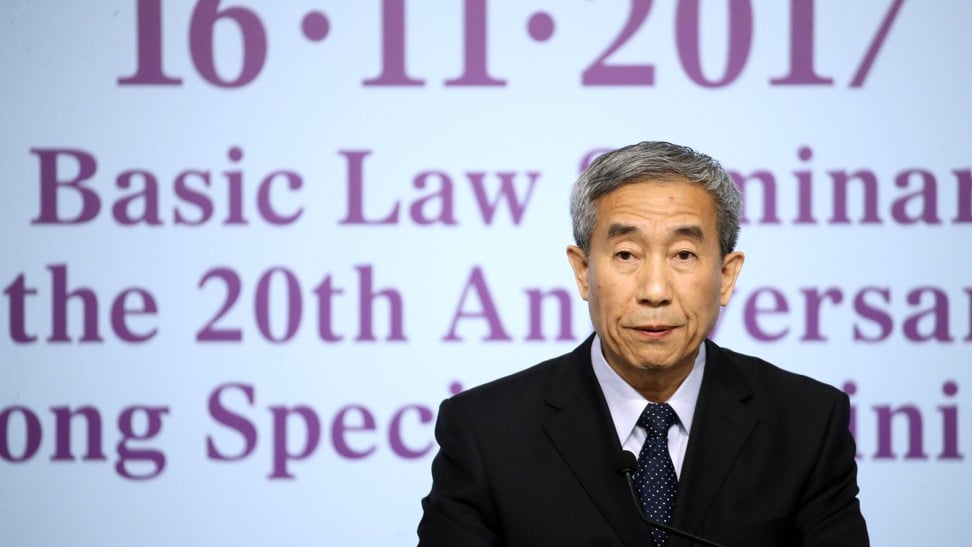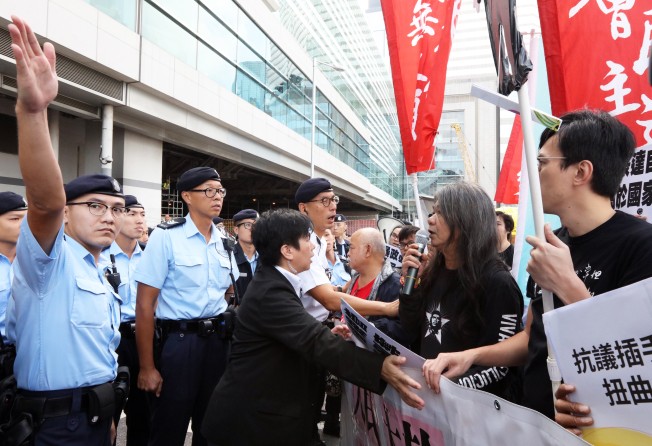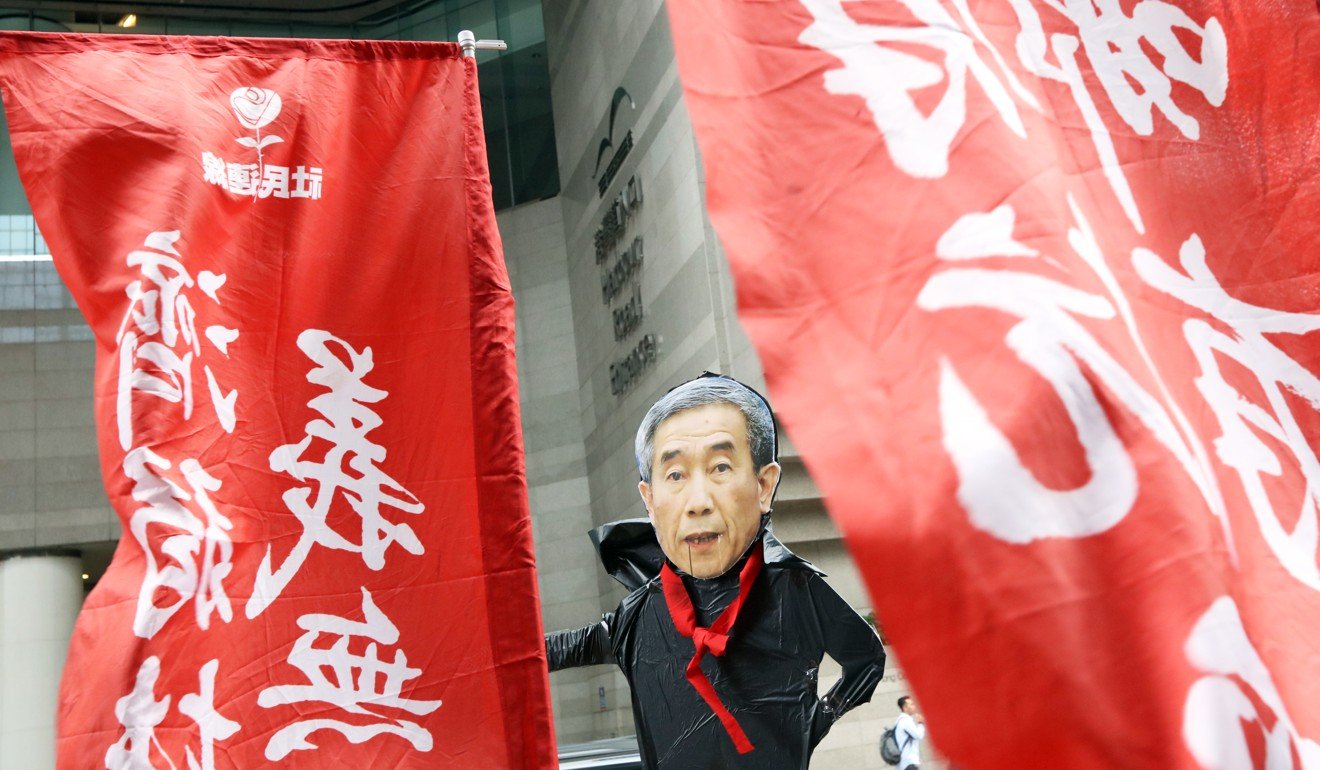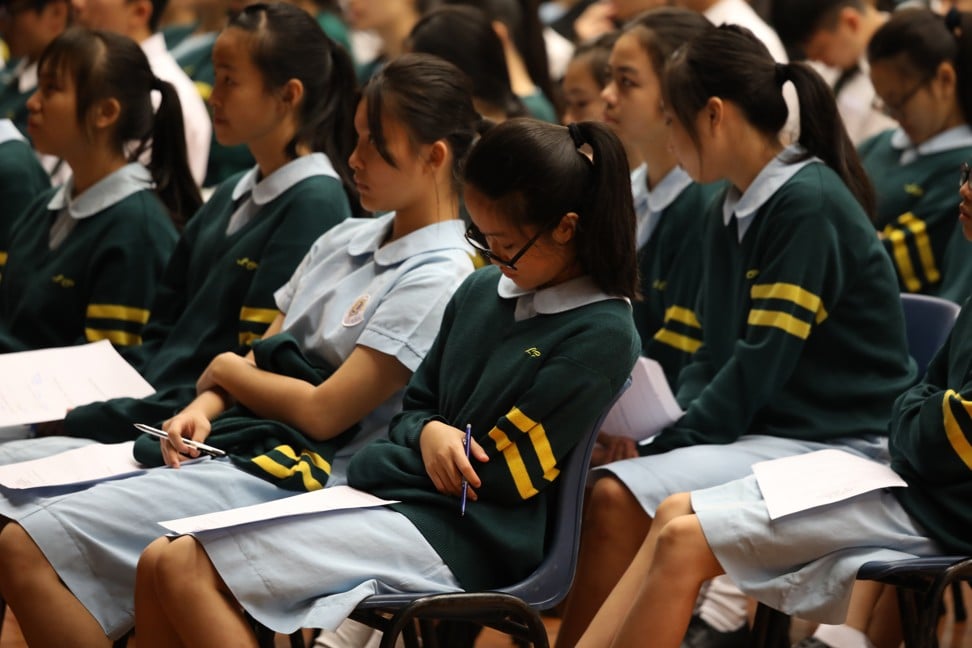
Beijing signals impatience at Hong Kong’s delay in enacting national security law
In speech broadcast to 50 local schools, Basic Law Committee head focuses on Hongkongers’ lack of respect for China’s sovereignty over city

Beijing has signalled its impatience at Hong Kong for making no progress in rolling out a controversial national security law, suggesting the city is already paying the price with independence advocates exploiting the lack of such legislation.
Li Fei, a senior mainland Chinese official who specialises in the city’s mini-constitution, also made it clear at a Basic Law forum in Wan Chai on Thursday that Beijing would “jointly govern” Hong Kong with direct control over “important issues”, while the city’s autonomy would be limited to local affairs.
“The Basic Law has been in place for 20 years, [but] Article 23 legislation is still not enacted. The duty is unavoidable,” said Li, who heads the Basic Law Committee under China’s top legislative body, the National People’s Congress Standing Committee.
Article 23 of the mini-constitution obliges Hong Kong to enact laws against treason, sedition and subversion. The issue has been shelved and successive governments have been wary about reviving it after a public backlash during the last attempt to introduce such legislation in 2003, when 500,000 people took to the streets to oppose it.
Visiting Hong Kong to drive home the message less than a month after the 19th Communist Party Congress, Li said President Xi Jinping’s speech at the twice-a-decade gathering had been “more detailed on Hong Kong than ever”.

“Within Hong Kong, the central government will jointly govern Hong Kong with the local authorities,” he said. “The central authorities would directly manage certain important issues, while the more local affairs would be managed by Hong Kong, as delegated by the central government.”
While praising Chief Executive Carrie Lam Cheng Yuet-ngor’s economic policies, Li devoted most of his 50-minute speech to Hongkongers’ lack of respect for China’s sovereignty and constitutional authority over the city.
Beijing exercised top-down constitutional rule over the city, Li said, adding that the notion of Hong Kong people ruling Hong Kong “does not mean that Hong Kong people take care of everything by themselves and the central government takes care of nothing”.
He also slammed those who were “deliberately rejecting” the relevance of the Chinese constitution to Hong Kong’s status as a special administrative region.
“It is incorrect to suggest that the Basic Law is Hong Kong’s constitution while deliberately ignoring our country’s constitution, or to suggest that the HKSAR’s constitutional foundation is based on the Sino-British Joint Declaration,” Li said, referring to the 1984 deal that provided the city’s constitutional foundation.

After Li explained “where Hong Kong is from”, citing the city’s history, he moved on to the topic of “who Hong Kong is”, dismissing recent talk about independence or self-determination. He ended his speech on the subject of “what should Hong Kong do”, focusing on Article 23 legislation and respecting the national constitution.
“The prerequisite is [for everyone in Hong Kong] to respect the reality that the country is under the leadership of the Chinese Communist Party,” Li said.
“In recent years, some people – in society and on campuses – reject ‘one country’ and resist the central authorities, and talk about localism, self-determination or Hong Kong independence.
“They use all sorts of fallacy and heresy to deny and slander the central government’s administration of Hong Kong.”
He went on to declare: “The negative impact arising from the legal loophole [due to the lack of Article 23 legislation] is all too obvious.”
Responding to Li’s call to get cracking on Article 23, Chief Secretary Matthew Cheung Kin-chung said: “We will definitely not avoid the question, but we must get the timing right.”
Asked if the legislation would be rolled out within the next two years, Cheung replied: “The current administration still has four years and more to go, right?”
Lam, who attended the event and gave a short opening speech calling on Hong Kong’s youth to better understand the Basic Law, left with Li and did not answer questions from the media.
After attending the seminar, veteran Beijing loyalist and former legislator Tam Yiu-chung suggested the Hong Kong government should enact national security legislation within the next four years.
“There are still fours years before this government’s term expires – it should be able to do the job,” he said.
Asked if more people would come out to oppose the bill, as they did in 2003, Tam said: “If we explain it well and the people understand that this is needed, maybe the same thing will not happen again.”
Raymond Tam Chi-yuen, former secretary for constitutional and mainland affairs, said: “The need for and significance of Article 23 legislation have become more and more obvious. I think the local government will be pondering when will be a good time to launch it.”
Watch: What is the Basic Law of Hong Kong?
But executive councillor Ronny Tong Ka-wah said Hong Kong “lacks an atmosphere favourable for such a legislation”.
“I don’t think that it can be achieved in at least the next year or two ... The Hong Kong government understands the situation clearly. I don’t think Li’s remarks would exert any extra pressure on the administration,” he said.
Tong said Li’s emphasis on Article 23 showed that Beijing was “concerned and worried” about anti-mainland sentiment in Hong Kong.
Ip Kin-yuen, the only pan-democrat lawmaker at the seminar, said Article 23 legislation must not be enacted before a democratic political system is installed in the city.
“Without a democratic system, there would be a lot of worries about national security legislation ... A balance needs to be struck between national security and protecting the people’s rights,” he said.
